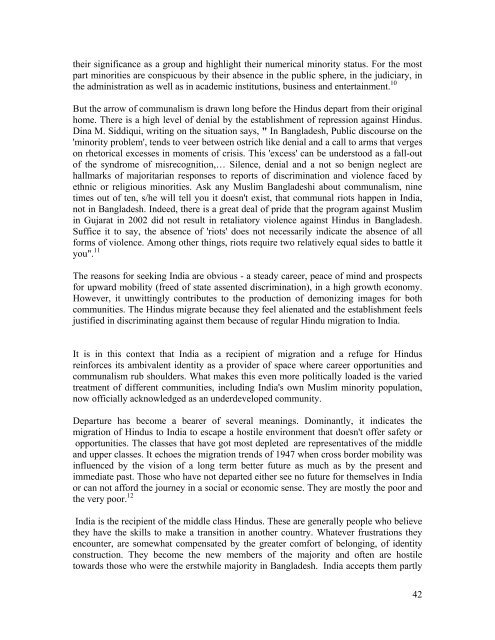Living on the Margins. Minorities in South Asia - EURAC
Living on the Margins. Minorities in South Asia - EURAC
Living on the Margins. Minorities in South Asia - EURAC
- TAGS
- minorities
- eurac
- www.eurac.edu
You also want an ePaper? Increase the reach of your titles
YUMPU automatically turns print PDFs into web optimized ePapers that Google loves.
<strong>the</strong>ir significance as a group and highlight <strong>the</strong>ir numerical m<strong>in</strong>ority status. For <strong>the</strong> most<br />
part m<strong>in</strong>orities are c<strong>on</strong>spicuous by <strong>the</strong>ir absence <strong>in</strong> <strong>the</strong> public sphere, <strong>in</strong> <strong>the</strong> judiciary, <strong>in</strong><br />
<strong>the</strong> adm<strong>in</strong>istrati<strong>on</strong> as well as <strong>in</strong> academic <strong>in</strong>stituti<strong>on</strong>s, bus<strong>in</strong>ess and enterta<strong>in</strong>ment. 10<br />
But <strong>the</strong> arrow of communalism is drawn l<strong>on</strong>g before <strong>the</strong> H<strong>in</strong>dus depart from <strong>the</strong>ir orig<strong>in</strong>al<br />
home. There is a high level of denial by <strong>the</strong> establishment of repressi<strong>on</strong> aga<strong>in</strong>st H<strong>in</strong>dus.<br />
D<strong>in</strong>a M. Siddiqui, writ<strong>in</strong>g <strong>on</strong> <strong>the</strong> situati<strong>on</strong> says, " In Bangladesh, Public discourse <strong>on</strong> <strong>the</strong><br />
'm<strong>in</strong>ority problem', tends to veer between ostrich like denial and a call to arms that verges<br />
<strong>on</strong> rhetorical excesses <strong>in</strong> moments of crisis. This 'excess' can be understood as a fall-out<br />
of <strong>the</strong> syndrome of misrecogniti<strong>on</strong>,… Silence, denial and a not so benign neglect are<br />
hallmarks of majoritarian resp<strong>on</strong>ses to reports of discrim<strong>in</strong>ati<strong>on</strong> and violence faced by<br />
ethnic or religious m<strong>in</strong>orities. Ask any Muslim Bangladeshi about communalism, n<strong>in</strong>e<br />
times out of ten, s/he will tell you it doesn't exist, that communal riots happen <strong>in</strong> India,<br />
not <strong>in</strong> Bangladesh. Indeed, <strong>the</strong>re is a great deal of pride that <strong>the</strong> program aga<strong>in</strong>st Muslim<br />
<strong>in</strong> Gujarat <strong>in</strong> 2002 did not result <strong>in</strong> retaliatory violence aga<strong>in</strong>st H<strong>in</strong>dus <strong>in</strong> Bangladesh.<br />
Suffice it to say, <strong>the</strong> absence of 'riots' does not necessarily <strong>in</strong>dicate <strong>the</strong> absence of all<br />
forms of violence. Am<strong>on</strong>g o<strong>the</strong>r th<strong>in</strong>gs, riots require two relatively equal sides to battle it<br />
you". 11<br />
The reas<strong>on</strong>s for seek<strong>in</strong>g India are obvious - a steady career, peace of m<strong>in</strong>d and prospects<br />
for upward mobility (freed of state assented discrim<strong>in</strong>ati<strong>on</strong>), <strong>in</strong> a high growth ec<strong>on</strong>omy.<br />
However, it unwitt<strong>in</strong>gly c<strong>on</strong>tributes to <strong>the</strong> producti<strong>on</strong> of dem<strong>on</strong>iz<strong>in</strong>g images for both<br />
communities. The H<strong>in</strong>dus migrate because <strong>the</strong>y feel alienated and <strong>the</strong> establishment feels<br />
justified <strong>in</strong> discrim<strong>in</strong>at<strong>in</strong>g aga<strong>in</strong>st <strong>the</strong>m because of regular H<strong>in</strong>du migrati<strong>on</strong> to India.<br />
It is <strong>in</strong> this c<strong>on</strong>text that India as a recipient of migrati<strong>on</strong> and a refuge for H<strong>in</strong>dus<br />
re<strong>in</strong>forces its ambivalent identity as a provider of space where career opportunities and<br />
communalism rub shoulders. What makes this even more politically loaded is <strong>the</strong> varied<br />
treatment of different communities, <strong>in</strong>clud<strong>in</strong>g India's own Muslim m<strong>in</strong>ority populati<strong>on</strong>,<br />
now officially acknowledged as an underdeveloped community.<br />
Departure has become a bearer of several mean<strong>in</strong>gs. Dom<strong>in</strong>antly, it <strong>in</strong>dicates <strong>the</strong><br />
migrati<strong>on</strong> of H<strong>in</strong>dus to India to escape a hostile envir<strong>on</strong>ment that doesn't offer safety or<br />
opportunities. The classes that have got most depleted are representatives of <strong>the</strong> middle<br />
and upper classes. It echoes <strong>the</strong> migrati<strong>on</strong> trends of 1947 when cross border mobility was<br />
<strong>in</strong>fluenced by <strong>the</strong> visi<strong>on</strong> of a l<strong>on</strong>g term better future as much as by <strong>the</strong> present and<br />
immediate past. Those who have not departed ei<strong>the</strong>r see no future for <strong>the</strong>mselves <strong>in</strong> India<br />
or can not afford <strong>the</strong> journey <strong>in</strong> a social or ec<strong>on</strong>omic sense. They are mostly <strong>the</strong> poor and<br />
<strong>the</strong> very poor. 12<br />
India is <strong>the</strong> recipient of <strong>the</strong> middle class H<strong>in</strong>dus. These are generally people who believe<br />
<strong>the</strong>y have <strong>the</strong> skills to make a transiti<strong>on</strong> <strong>in</strong> ano<strong>the</strong>r country. Whatever frustrati<strong>on</strong>s <strong>the</strong>y<br />
encounter, are somewhat compensated by <strong>the</strong> greater comfort of bel<strong>on</strong>g<strong>in</strong>g, of identity<br />
c<strong>on</strong>structi<strong>on</strong>. They become <strong>the</strong> new members of <strong>the</strong> majority and often are hostile<br />
towards those who were <strong>the</strong> erstwhile majority <strong>in</strong> Bangladesh. India accepts <strong>the</strong>m partly<br />
42

















